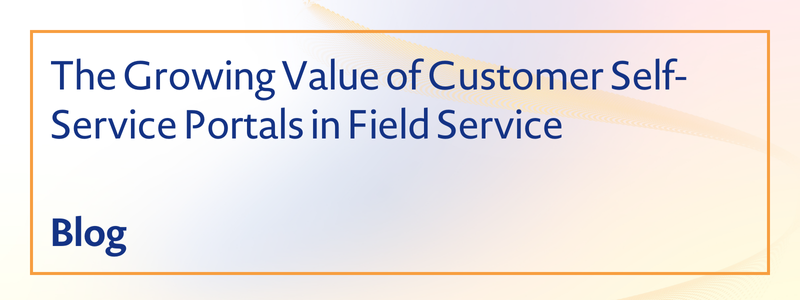Field Service Next West 2026 Blog
Session Recap: Using Social Media for Targeted Recruitment: Key Takeaways from Josh Zolin at Field Service Palm Springs

A practical session recap revealing how modern service organizations can use social media platforms for targeted recruitment and building a trustworthy employer brand, straight from Field Service Palm Springs.
Session Recap: AI-Powered Field Service: 5 Key Takeaways from Rajib Bora at Field Service Palm Springs 2025

Discover how Freudenberg e-Power Systems is leveraging AI to enhance labor efficiency, battery safety, and technician support in the field service industry, as presented by VP Rajib Bora.
Session Recap: Preparing Technicians for Success: Key Takeaways from Dave Pitchford at 2025 Field Service Palm Springs

Explore how Dave Pitchford, Director of Customer Operations at The Coca-Cola Company, leverages data-driven tools and analytics to empower service technicians and elevate the customer experience at the 2025 Field Service Palm Springs event.
Session Recap: Global Spare Parts Harmony: Key Takeaways from Chris Dickerson at Field Service Palm Springs

Chris Dickerson, VP of Service Planning & Logistics at Nokia, discussed the integration of data analytics and AI to elevate SLA commitments and maximize profits during Field Service Palm Springs 2025. This recap covers essential strategies and leadership insights for service logistics professionals.
Session Recap: Red Carpet Ambition: Key Takeaways from Fabio Raffone at Field Service Palm Springs 2025

Learn how Fabio Raffone of Tetra Pak pioneered a “red carpet” service culture to reduce turnover, build trust, and nurture leadership in service operations at Field Service Palm Springs.
From Now to Next: Why Solutions-Based Deployments Are the Future of Field Service Technology

In field service, things are moving fast — and companies are feeling the pressure. More layers of operational complexity. Higher expectations from all directions through various stakeholders. Organizations are somehow expected to be fully tuned into the technological pulse while still managing to reduce costs and accelerate implementation timelines.
The Future of Personalization and Contextualization in Field Service

Field service customers expect organizations to know their unique needs before they set out to fix their assets. Recent studies by Field Service Insights indicate that many companies are struggling to create a service model based on the personal context of their customers. This article explores how field service organizations can achieve personalization and contextualization in their service delivery, so they can significantly improve the customer experience.
Strategies for Addressing the Field Service Labor Crunch

Field service teams are struggling to hire enough technicians to fill their rosters. While there is some evidence that Gen Z will be more likely to take up the trades than their millennial counterparts, field service organizations must take steps now to improve their staffing strategies. This article explores what strategies field service organizations can use to retain, upskill, and recruit employees during the current field service labor crunch.
The Top Five Drivers Impacting Field Service in 2025

As field service organizations get ready to implement their strategies for 2025, it will be critical for them to stay on top of trends that will impact the industry. A new generation of field service leaders is about to take the reins, bringing substantial changes to how teams operate. Organizations’ artificial intelligence programs are reaching maturity, leading to a significant transformation in how companies deliver service and interact with customers.
Strategies for Enhancing Commercialization in Field Service

Field service organizations can use advanced technologies to commercialize their operations and deliver new revenue to the business. This article explores the potential of field service operations to become significant profit generators.
Achieving First-Time Fixes with Remote and Self-Service Solutions

Our latest article explores how field service departments can significantly enhance their first-time fix rates by leveraging remote and self-service technologies. This article is particularly relevant as businesses like yours seek innovative ways to improve service efficiency and customer satisfaction.
Attracting, Retaining, and Developing a Field Service Force

Are you looking to attract, retain, and develop a strong field service team? Our latest article highlights key tips for each stage of the process. Check out our post to learn more.
Using Data Analytics & Business Intelligence in Field Service

Our latest article explores how field service departments can harness data analytics and business intelligence to enhance operations and customer experience. Don't miss the chance to discover key strategies for boosting your service efficiency through intentional data usage.
Prioritizing Technician Health and Safety in Field Service

Field service technicians face a significant number of health and safety risks while out in the field and keeping them safe should be an organization's top priority. Our latest article provides insightful tips and strategies on prioritizing the health and safety of field service technicians, as well as some suggestions for how technology can help.
The Elite Service Culture™ - A Strategic Approach to Sustained Team Success

While every customer interaction is a combination of people, processes and tools, the people aspect is the most impactful variable of the customer experience and at times can compensate for other deficiencies. When a customer experience reaches the "feel good” status, it is more likely associated with a repurchase or recommendation to a friend.”
Culture Chillers and Performance

For the mature service organization, leaders strive to build their operations to succeed not only when they are present, but to function at consistently high levels when they are away. Within these high-functioning robust service operations, decisions are routinely, almost automatically being made much like a vehicle in autopilot-mode with capabilities that exceed human abilities.
How Daikin Is Managing the Lifecycle of Shopping Centre Air Conditioning

Ensuring the effectiveness and efficiency of assets throughout their product lifecycle is a top priority for field service providers. Customers need to be confident their assets will not let them down at any point during their installation. In today’s blog we discover how Daikin’s use of plug and play technology and reclaimed refrigerants are helping them better manage the entire lifecycle of its air conditioning products.
How Johnson Controls Is Helping Microsoft Create Smarter Buildings

With last year’s COP26 conference seeing China commit to a 65% reduction in its carbon emissions, corporations operating in the region need to step up and do their bit to help it meet this lofty goal. In today’s blog, we discover how Johnson Controls and Microsoft are working together to create smarter and more sustainable buildings in China.
How Krones Is Adopting a Digital Mindset with AI Inspection Technology

Since the COVID-19 pandemic disrupted all our lives an increasing number of businesses are accelerating digital transformation and adopting a mindset which prioritizes the process. This digital first mindset will be a key brand differentiator in the future. In this week’s article, we discover how Krones is exemplifying this process with a unique collaboration platform and incredible AI powered inspection technology.
National Instruments Has Developed a Maintenance as a Service Solution

Unplanned downtime can result in significant losses to both productivity and revenue. Predictive maintenance and condition monitoring can help avoid unplanned downtime but can be difficult to implement. In this article we discover how National Instruments has developed a new plug and play maintenance as a service solution which makes predictive maintenance and condition monitoring easier than ever.
Why Prescriptive Maintenance Should Be on Your Radar

Predictive maintenance has been stealing the headlines in field service circles for some time now, but 2023 is the year for an evolution of the concept to finally take hold and provide us with a method of reducing the likelihood of faults ever occurring. In this article we discuss the concept of prescriptive maintenance, its benefits, and suggest a framework for implementation.
Why Remote Service Needs to Be on Your List

The ability to conduct remote field service is set to become a key brand differentiator in the future. Increased customer satisfaction, improved health and safety, and better training and development are just a handful of the benefits. In this week’s blog post we discuss how the COVID-19 crisis changed attitudes to remote work and how augmented reality technology is now helping field service providers perform their role better than ever before.
Here’s How Schneider Electric Became Number One for Sustainability

As the effects of manmade climate change are felt ever more keenly around the world, there is an urgent need for large corporations to step up and do their part in reducing emissions and prioritize sustainability. In this article, we focus on Schneider Electric and catch up with how it’s making good on the ambitious sustainability goals it laid out back in 2021.
How Siemens Takes HR and Workforce Planning Digital

Workforce planning is one of the biggest challenges facing the industry today. From tackling the talent crisis, to ensuring staff are deployed effectively and efficiently, an increasing number of brands are waking up to the ways digital technology can supercharge workforce planning. In today’s article, we look at three of the way Siemens is leveraging digital technology for better workforce planning.
Speeding Up Root Cause Analysis in Field Service

Any field service task begins with root cause analysis – after all, how can a technician repair a fault without first deducing what the problem is? Many field service providers are still relying on inefficient manual processes in their root cause analysis routines. In this article, we discuss how providers can accelerate their roof cause analysis processes and make the case for root cause as a service platforms.
Finding Techs and Engineers in a Tight and Shrinking Labor Pool

As the post-pandemic talent crisis continues to pose significant challenges for the field service industry, brands in the space are having to rethink their HR operation to attract techs and engineers into the business. In this week’s article we discuss the scale of the crisis, the concept of quiet quitting, and how field service providers need to rethink the employer/employee relationship if they want to remain competitive
Advancing Service Together: Spotlight on the Field Service USA 2022 Conference

Everyone knows that Digitalization is reshaping the industry and human culture, but what exactly does this mean for you and your team? Digitization trends have a seismic impact on service organizations and their ability to deliver value. It is enabling new levels of collaboration, extending delivery to those who previously could not get it, and increasing the speed of delivery.
A Preview of the Third Annual Field Service Emerging Technologies Report

After two years of disruption, field service teams are preparing for another year of technology-enabled services. And while many look forward to a return to relative normalcy, most would agree that the procurement function may never be the same again. This report will explore how field service organizations’ technology strategies have changed over the past year. It will include key insights from decision makers and benchmarking information about companies’ service strategies.
Entering the Age of Automation in Field Service

The field service industry is rapidly changing. No longer can businesses rely on a customer service representative to take a ticket and then dispatch a technician. With automation, businesses can now offer their customers self-service options that allow them to resolve common issues on their own. In this article, we will explore how field service organizations are entering the age of automation and how they are meeting the needs of a more tech-centric customer base.
Cummins, Multi-Fuel Engine Platforms, and Their Impact on Fleet Management

Field service and fleet management professionals are always looking for ways to improve efficiency and reduce costs. Many field service and fleet managers are considering multi-fuel options as a likely bridge toward sustainability. In this article, we’ll explore what multi-fuel engine platforms and the future of electric vehicles mean for fleet management.
Partnering with the Chief Information Officer to Deliver Better Outcomes for Customers

Field service operations typically delegate customer service leadership to a specific executive, such as the chief service officer (CSO). While this model has worked in the past, CSOs must partner with other executives to achieve customer success. Here's why field service operations should partner with the chief information officer (CIO) to deliver better outcomes for customers.
The Benefits of Event Sponsorship at Field Service Palm Springs

WBR’s Field Service Palm Springs is the leading event for forward-thinking field service and support businesses. Here’s how event sponsorship can open doors for your organization.
Customer Support: What Service Executives Can Learn from Best Buy

According to the Best Buy website, its 1-year Geek Squad 24/7 support offering has 4.5 out of 5 stars. Best Buy may be a retailer, but the company's focus on customer success can serve as a powerful template for the service industry. Here's what service executives can learn from Best Buy.
Customer Service is Everyone’s Responsibility

Customers are now more demanding than ever, and it takes more than a customer service department to empower them and handle their requests. Here's how more organizations can become customer-centric by aligning their departments and ensuring everyone takes responsibility for customer delight.
5 CX Tips for Field Service Professionals from Disney

If there’s one thing Disney and its theme parks are known for, it’s top-notch customer service. In a way, field service organizations are in the same business. At the end of the day, world-class field service is all about creating positive experiences for customers and making their lives better.
Toyota’s IoT Investments Could Be Big News for Field Service

Not only do field service organizations need to maintain and account for their vehicles, but they also need to ensure that their fleet operations align with their strategic business goals. A Toyota subsidiary recently made a significant investment into IoT technology, and it could lead to significant changes to how commercial fleets operate.
Building an Industry-Leading Customer Experience in Field Service

Field service organizations have evolved over the years, and that’s in no small part due to their technology implementations. New software integrations have improved efficiency by adding automation and by digitizing internal processes. Here’s how field service organizations are using technology to become industry leaders.
Four Top Field Service Challenges for 2022

As we move out of 2021 and begin to prepare for another new year, it seems a suitable time to take stock of what has gone on before and brace ourselves for some of the challenges we’re likely to come up against in 2022.
John Deere Transforms Plant Maintenance with Precision Construction

Responsible for much of the food we eat, the roads we travel on, and the buildings we live, work, and play in, agriculture and plant machinery are so deeply ingrained in the infrastructure of our lives, it’s often easy to forget about them. John Deere understands this all too well and has maintained its market position and reputation through a spirit of constant innovation and forward momentum.
Here’s How Caterpillar Is Achieving New Levels of Plant Uptime

Uptime is the metric nearly all field service success is measured and all brands in the business should have this goal in mind. Downtime costs customers money and damages their reputation as they fail to meet targets and therefore disappoint their own clients further down the value chain. As such, avoiding unplanned downtime should be a top priority for field service providers.
Here’s How Ford Motor Company Is Preparing for a Connected World of Motoring

One area of life which has been relatively slow to become fully connected has been the world of automobiles. Naturally, it has been slightly more challenging to facilitate connected cars, due to them having to rely on mobile technology rather than hardline, but we are now seeing more and more vehicles with the ability to get online and offer drivers a new era of digital experiences.
Here’s How Ricoh Is Focusing Squarely on Digital Services

While many countries are now coming out of the worst of the pandemic, thanks to vaccinations, the daily infection rates are still high and mask wearing, and social distancing continue to be recommended. This environment is leading to some companies changing their focus entirely and prioritizing digital services to make their offering more relevant than ever.
Here’s How Acuity Brands Is Using Connected Technology to Make Buildings More Sustainable

Field service has a role to play in the quest for sustainability. Not only in the way we operate as independent organizations, but also in the way we service and maintain the buildings we are responsible for. We are in a unique position where we can influence the operation of other companies outside of our own brands and find way to make them more sustainable.
Here’s How Siemens and SAP Are Leveraging Their Partnership to Boost Medical Asset Management

As one of the biggest names in technology, and particularly healthcare, Siemens fully understands the value of partnerships, as evidenced by the recent expansion of its relationship with CRM solutions provider, SAP.
Here’s How 3D Systems Is Transforming Manufacturing and Service with 3D Printing

The popularity and proliferation of 3D printing – or additive manufacturing as it’s also known – can be attributed to a relatively small group of early adopters which have been experimenting with the technology from its fledgling days and pushing the limits of what is possible.
Here’s How Kone Is Coming Up with Solutions for the New Normal

Despite the fact the SARS-COV-2 coronavirus continues to rage around the planet, many countries are now trying to return to some semblance of normality. With many workplaces being located in tall buildings, this unfortunately means elevators have become a necessary part of life once again. The need for more sensitive elevator use and service models is being keenly felt within the industry.
Here’s How Cummins Is Driving Sustainability Through Distributed Energy Resources

In the world of field service, one of the best methods to contribute towards a more sustainable planet is to assist clients with better management of their assets. By focusing on factors such as energy consumption – a major contributor of carbon emissions – brands can lessen their environmental impact and benefit their bottom line.
Environmental, Social and Governance (ESG) in Field Service

There is no action a company can take that does not have a direct or indirect impact on communities and the environment. Recent events have only reiterated the importance of corporate responsibility. The public expects companies to formulate a direct stance on social issues and to be transparent about financial dealings, environmental impact, and employee culture.
The Growing Value of Customer Self-Service Portals in Field Service

Self-service is a trending topic in various areas of business. Over the past several years, consumer-facing organizations have spearheaded the concept of self-service and embraced a range of digital capabilities to make customer interactions easier and more streamlined.
Outsourcing Non-Core Service Functions in Field Service

Field service organizations have taken significant steps to transform themselves into agile and digital-first operations. Many organizations have chosen to outsource some aspects of their business, including core operations to trusted contractors and technology firms.
What Field Service Technicians Like About Remote Assistance

Remote assistance was just one of the many technologies field service technicians encountered during organizations' digital transformations over the past several years. Some field service organizations felt that adopting remote assistance tools was a no-brainer—it was affordable, could make technicians' lives easier, and could improve the customer experience in the process.
Safelite AutoGlass Exemplifies Optimal Route Resourcing and Planning

One organization that has seen significant success through its route and fleet planning solutions is Safelite AutoGlass. In this article, we discuss how this vehicle glass repair, replacement, and recalibration company won accolades by embracing data and technology.
Generating Business Value from Remote Assistance

In the field service sector, remote assistance tools are often discussed from a technician's perspective. After all, most remote assistance tools are utilized by technicians themselves, whether they are viewing a schematic overlay of a machine via augmented reality or connecting with a service veteran hundreds of miles away to diagnose a challenging problem.
The Future of Staff Management and Development in Field Service

The field service landscape is changing rapidly. Much of this change is being driven by technology, including the technology adoptions of field service customers themes. Many field service customers are now demanding increased options for self-service. They also have higher expectations for service visits and first-time fix rates...
Using Service Fundamentals to Drive Operational Excellence in Modern Field Service

Field service organizations have evolved from break-fix customer service operations into proactive and value-driven partnerships that work alongside customers to drive value. These changes are in no small part due to the onboarding of new technologies, such as Internet-of-Things (IoT) sensors and artificial intelligence (AI)...
Using Technology and Data to Make Your Service Department Smarter and Faster

Field service departments at the largest organizations now have a global reach. Some companies service customers and assets across every continent, spanning multiple cultures and languages. Although this development is representative of the far-reaching abilities of the field service sector, it also creates challenges...
Energy Transition and Asset Management – Baker Hughes Has Its Priorities Straight

As the effects of man-made climate change continue to be felt ever more keenly around the world, the need for energy companies to seriously invest in energy transition has never been more important. As one of the industry’s largest field service providers, Baker Hughes is investing heavily in energy transition technology and the digital transformation needed to make the world a more carbon-neutral place.
Here's How Honeywell Levelled Up Its Offering During the COVID-19 Crisis

The coronavirus crisis has reshaped the landscape of global industry. There’s simply no way of getting around the fact that we will be living with its effects for some time to come. In this post, we look at how Honeywell levelled up its offering with several laudable and COVID-specific innovations.
Here’s How Johnson & Johnson Is Using Its Predictive Analytics Expertise to Fight COVID-19

Discover how Johnson and Johnson has been deploying the kind of predictive analytics normally used in field service to fight this devastating plague.
NCR’s ATM-as-a-Service Innovation is Lifting Weight from Clients’ Shoulders

Explore how NCR is providing an innovative ATM-as-a-Service offering which makes sure retailers can offer ATM services while outsourcing their day-to-day maintenance and upkeep.
Schneider Electric Is Taking Field Service from Reactive to Prescriptive Maintenance

More and more brands are moving away from the old method of simply reacting to issues as they occur, and instead using the very latest in modern technology to provide a more proactive service. In this post, we look at how Schneider Electric is advancing this proactive approach and deploying exciting technology – such as augmented reality – to achieve it.
Siemens and APM – Managing a New World of Energy Provision

The world of energy provision is changing. Deregulation and a new focus on renewables are transforming the role of fossil fuel plants in the energy ecosystem. In this article, we look at how Siemens is helping meet this need with a new kind of asset management – APM – and how it is strengthening its partnership with SAP to offer an improved suite of cloud-based asset management tools.
Why Service Must Go On: Getting Back To “Normal”

Karin Hamel, Vice President U.S. Digital Buildings, North America Operations at Schneider Electric, shares what steps Schneider Electric took to keep Service performing throughout the pandemic and where they’re headed in today’s new reality for service organizations.
Benchmarking the Most Important Field Service KPIs to Drive Critical Employee and System Behaviors

Field service executives and frontline managers can waste a lot of time chasing too many – or not the correct – KPIs. If you are striving to encourage the proper system and employee behaviors, what are the critical KPIs to track?
How Will Edge Computing Change Field Service?

Today's field service organizations use networks of IoT-connected technologies to generate and aggregate data. That data is what they use to monitor deployed machines and tools in the field, generate reports on the status of their service agreements, and automate solutions for field service challenges in real-time.
Asset Visibility Leads to New Capabilities in Field Service

As field service organizations continue their efforts toward digital transformation, new capabilities and service offerings are emerging as a result. Central to these organizations' transformations is a relatively simple concept: asset visibility.
Field Service Connect Events Present a Unique Opportunity: One-to-One Meetings

The past year has provided field service organizations with some hard-earned lessons, but also new opportunities. The COVID-19 pandemic caused disruptions to almost every industry. Supply chains struggled to keep up with demand, and many field service teams were forced to significantly alter their operations to protect the health of employees.
Mega Trends for Chief Service Officers: 3 Long-Term Trends and How to Take Advantage

As heads of their organizations' field service operations, chief service officers already have a lot on their plate. The past year hasn't made their jobs any easier, either.
Field Service Technician Burnout and What to Do About It

Employee burnout is a significant problem across business sectors. According to Deloitte, 77% of professionals say they have experienced burnout at their current job. The same study also found that 91% of professionals believe having an unmanageable amount of stress or frustration impacts the quality of their work...
What EU MDR & IVDR Mean for Future Compliance in the Medical Device Industry

The European Union's (EU) Medical Device Regulation (2017/745) and In Vitro Diagnostic Regulation (2017/746) set standards and oversight requirements for manufacturers of medical devices and in vitro diagnostic solutions that intend to distribute their products in the EU. They are a much-needed replacement for decades-old regulations, bringing significant challenges and opportunities to these companies' operations.
Field Service Organizations Prepare for What's Next in Medical Technology

The size of the global medical technology industry reached over 450 billion U.S. dollars in 2019. Established centers of this industry include the United States and Western Europe, but industry trends show that countries in Asia—especially China—are about to play a more prominent role in the years to come.
Insights into Connecting Disparate Devices into a Single Service Environment

By connecting devices into a single service environment using IoT, field service organizations can more effectively leverage their asset data, engage in predictive and proactive maintenance, and gain better visibility into the end-user experience. If your organization is considering a widespread rollout of IoT technology, here are some insights into what it could mean for both your company and your customers.
IoT Connected Devices Are Reshaping Medical Field Service

Field service organizations that maintain medical devices in clinical settings faced a tumultuous year in 2020. Restrictions due to social distancing guidelines added new challenges to the process of maintaining the uptime of medical devices, deploying technicians, and pursuing future technology initiatives.
Managing Cyber Security in a Connected Field Service Environment

Field service organizations use a range of technologies to serve their clients. These technologies include software solutions like field service management (FSM) tools, hand-held devices, and IoT-connected products that gather data when operating in the field. But the adoption of new technologies also comes with inherent risks.
What Increased Augmented Reality Performance Means for Field Service Capabilities

AR was initially applied in field service as a tool to remove barriers during diagnostic procedures. Now, it is enabling field service teams to provide remote assistance to their customers. Here, we'll explore what the increased adoption and performance of AR means for field service.
Using Automated Knowledge Capture to Prepare the Next Generation of Field Service Professionals

When experienced technicians leave, they take their knowledge with them. The challenge for field service organizations is capturing that knowledge for new technicians. In the past, this was accomplished through apprenticeship and training programs, but knowledge capture tools are enabling organizations to maintain institutional knowledge automatically.
Maintaining the Health and Safety of Your Field Service Workforce After the Pandemic

Moving forward, field service organizations could continue to use contactless field service options to serve customers. Not only do these capabilities keep their technicians safe, but they can also provide clients and end-users with more flexible service options.
ABB Uses AI Strategy to Aid Clients With Their Field Service Workforces

Artificial intelligence is not immune to the odd bout of hyperbole, but the technology has great potential in allowing the devices we use in our work to make decisions and learn in a similar fashion to their human operators. Now, Zurich-based ABB is employing the technology to help keep clients' field service workforces on task.
Fresenius Kabi Seeks to Use Augmented Reality to Shake Up Field Service

The field service industry is now seeing a range of disruptive digital technology making its way into the workplace. Internet of Things (IoT), artificial intelligence and machine learning, and big data are all being deployed to great effect, but Germany-based healthcare company Fresenius Kabi is putting its money on augmented reality technology.
Johnson Controls Makes It Into The Fortune 2018 Change the World List

With help from the technology and field service expertise of Johnson Controls, the University of Hawaii is working towards generating 100% of its energy from renewable energy. Johnson Controls has reached the #30 spot on Fortune Magazine's Change the World list of companies working to help the planet and solve social problems.
How Philips Healthcare is Helping to Keep the World's Hospitals Running

To stay relevant in 2018, it's crucial for field service brands to not only focus on the most proximate markets to themselves but to also think globally and find ways to access markets all over the world. This is exactly what Philips Healthcare is achieving with its new international partnerships.
Why Automation Is The Secret Ingredient For Your Field Service Workforce

The service industry is undergoing changes stemming from an aging pool of technicians, an increasing prevalence of connected, and thus more complex products in the field, and the growing demand for a high-standard of service that emphasizes predictive strategies and enhanced uptime. Sourcing for talent is becoming more challenging, yet the need for responsive service is growing.
Augmented Reality Will Support Field Service Techs in Every Aspect of Their Work

If your field service organization is not utilizing some form of AR tool already, the chances are it will be in the future. Here are some of the amazing ways this technology can be used.
Customer Satisfaction Is the New Battleground in the War for Field Service Satisfaction

Over time, as the competition for products grew in the commerce space, the service economy was born. You could now employ people to prepare products on your behalf and to your individual tastes. And here is where the need for customer satisfaction was born.
How The IoT Is Changing the Face of Field Service

We are living increasingly connected lives as we near the climax of the second decade of the 21st Century. Few of us are ever far from our smartphones and more and more of our everyday devices and gadgets are gaining connectivity and moving online. This ever-expanding network of devices is the Internet of Things (IoT) and it has great implications for the field service industry.
Productivity Focused Collaboration with Your Mobile Field Service Workforce

This report is based on recommendations made by the industry experts who participated in the webinar “Creating Video, AR and AI-Powered Productivity Focused Collaboration with Your Mobile Field Service Workforce.”
Alternative "B4B" Offerings May Be The Future of Field Service Provision

The modern field service landscape is changing. If you've been following these articles for any length of time, you'll have read about the ways in which Internet of Things, robotics, artificial intelligence, machine learning, augmented reality, and many other factors are forcing brands to innovate or be left in a cloud of dust by their more forward-thinking competitors.
How Field Service Management Software Open New Revenue Streams

The field service management market is on the up-and-up, with the latest research predicting growth from $1.78 billion in 2016 to $4.45 billion by 2022. This is leading more and more businesses to look to field service operations when creating their growth strategies.
How Companies Manage Service Operations to Deliver On Customer and Employee Expectations

Many companies struggle with developing outcome-based business models that will meet customer demand while still being practical for employees. To see what companies are tracking as far as progress, WBR and DSI surveyed 100 service executives to measure success metrics and preparedness among field service companies.